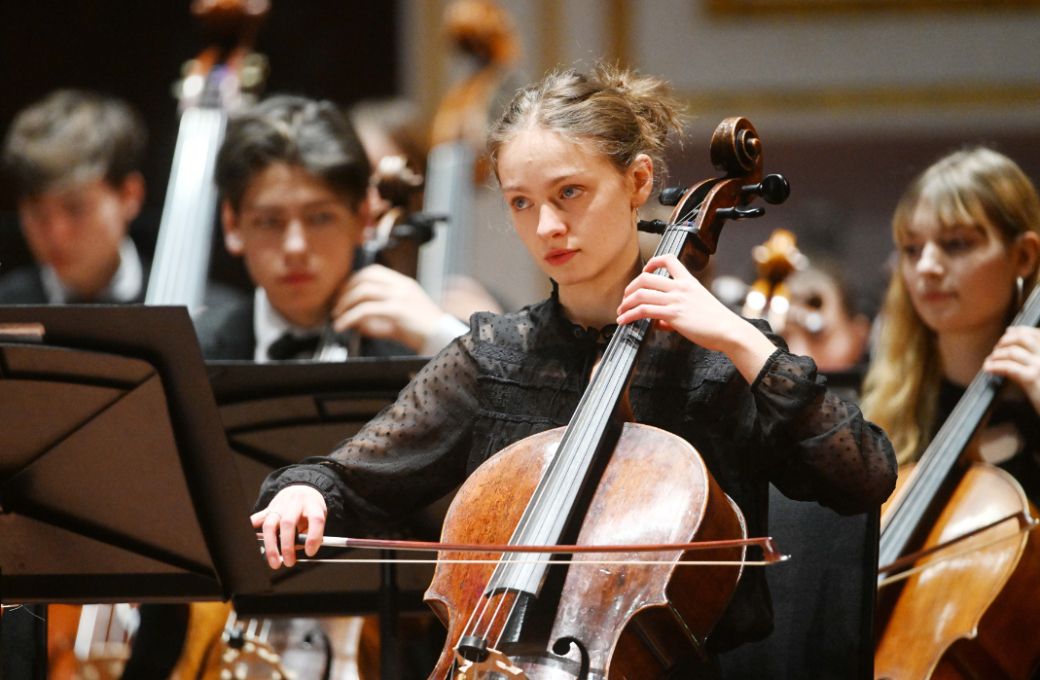There was an unusual amount of ambiguity about the identity of this orchestra as it toured the UK. The UK marketing described them as the German National Orchestra, “Official partner of the Berliner Philharmoniker”, but on their website they’re called the National Youth Orchestra of Germany. Why drop that word? Surely they didn’t expect that UK audiences would be put off by knowing their age? Shouldn’t that have made them even more exceptional? Either way, for the final date of the orchestra’s UK tour, Edinburgh’s Usher Hall played it safe by using both names (German National Youth Orchestra: Bundesjugendorchester). If there was any ambiguity about the name then there was certainly none about the playing, because this concert was a winner from start to finish.
The most obviously noticeable thing about the players, aside from their age, was just how many of them there were! That gave an extraordinarily big-boned tone to their playing of Purcell’s theme at the start of the Young Person’s Guide to the Orchestra, dominated by a particularly rich, luxurious body of strings whose sound was one in which to wallow. Conductor Wayne Marshall chose an uncomfortably fast tempo for much of Britten’s score, which meant that some of the dreamier variations – oboes, cellos – didn’t have space to breathe and, more seriously, that the climactic fugue didn’t really have anywhere to go. However, I loved the vigorous down-bowing from the violins in their variation, giving the impression that the couldn’t wait to get their teeth into the music, and the right-on-the-money precision of the woodwinds and brass was a complete delight.
Helene Caspar played the clarinet variation with a cheeky slur that seemed to look forward to her star moment in Rhapsody in Blue, and the way in which she took to the jazzy sweep of Gershwin’s music spoke more widely of the remarkable ease with which the players as a whole took to it. The strings eased gorgeously into their big slow theme, and principal trumpet Linus Michael Bremer seemed to be having an almost unseemly amount of fun waggling his mute during his solo. Directing from the keyboard, Marshall wasn’t afraid to milk the big orchestral moments, even if it led to him enjoying his solos just a little bit too much. His extended interpolations just crossed the line into self-indulgence, but you have to take your hat off to his use of Scottish themes to keep the local audience happy.

I could quibble with some aspects of their Planets: the end of Mars was distended out of all proportion to the rest of the piece, much of Jupiter was too fast, and Venus felt too loud. However, that's nitpicking when the overall tone of the performance was so confident and fearless. The end of Saturn, when the music slips into a blissful major key, was spine-tinglingly beautiful, all the textures balanced expertly, and Uranus’ magical antics stayed on the right side of being threatening rather than merely honky-tonk. The final chorus sounded unusually muscular, sung by a group of singers from both Germany and Manchester’s Royal Northern College of Music, but the blend with the orchestra was beautiful and set the seal on a performance of Technicolor energy and dramatic mystery.
Sir Simon Rattle, the orchestra’s Conductor Laureate, said of them that “the future of orchestras is safe in your hands.” Hear them and you'll understand why.


